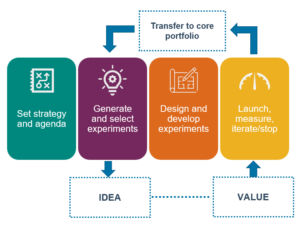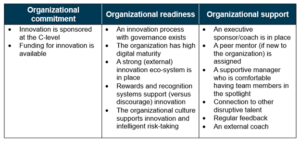Fueling Growth in Uncertain Times – Making Innovation a Team Sport
Today’s business environment is complex. Leaders are dealing with macro trends including the new world of work, continued technology and supply chain disruptions, consumer behaviour changes, and the need to combat climate change. Additionally, there is economic uncertainty driven by inflation, high interest rates, and the fear of a looming recession.
The typical response to uncertain times for many organizations is to cut costs, downsize, and pullback on investing in new initiatives and innovation. Research shows however that organizations that take this approach don’t win in the long or the short-term. According to research done by McKinsey, organizations that invest in innovation throughout periods of crisis have outperformed peers by 10% during the crisis. They also outperformed the market by 30% post crisis.
The challenge is that many organizations struggle to truly innovate. While many organizations cite innovation as a top priority, very few are prepared to scale innovation due to insufficient strategies, process and talent.
The importance of process
Some senior leaders feel the innovation should be organic and ideas should just bubble up. Theses leaders are confusing creativity and innovation.
Creativity is a key contributor to innovation. It can be defined as ‘the process that generates new and unexpected ideas.’ Creativity may generate new and different ideas, but creativity does not necessarily come up with ways to operationalize the idea and exploit it for business value.
Successful innovation requires focus and effort – it also requires a clearly defined process with governance. The goal of the process is to take new and different ideas and make them usable – or in other words implement them in a way that delivers business value as quickly as possible.
An effective innovation process (below) includes:
- A strategy and agenda that clearly identifies the focus of innovation efforts and includes funding for experiments.
- A technology-supported and widely understood process to generate and select ideas or experiments.
- Agile ways of working to rapidly design and develop prototypes for the selected experiments that allow a minimum viable product/solution to be launched to deliver value as quickly as possible. There should also be clear criteria for stopping an experiment.
- A process to transfer successful experiments to the core business and/or scale them broadly throughout the organization.

The importance of people
You also need to have the right people with the right competencies fueling the process. Research conducted META Profiling revels a set of characteristics and competencies shared by people who can be successful driving innovation within a corporate environment. These are people who can:
- Spot opportunities to do things in different ways and identify supporting ideas.
- Implement the ideas in a way that delivers business value.
- Work cooperatively within the many typical constraints of traditional organizations to maximize innovation results over the short and longer-term.
Referred to as ‘disruptive talent’ these people, when provided with the right support and conditions, can help to significantly accelerate innovation efforts, even in very traditional organizations. Specifically, they are more successful when the following are in place:

Call to action
As organizations look for ways to innovate during uncertain times, having the right processes and people in place can provide a distinct advantage. To advance your innovation capabilities:
- Assess the maturity of your innovation process and governance. Identify an action plan to optimize both.
- Develop a Disruptive talent strategy based on the innovation commitment and readiness of your organization.
- Align and equip talent acquisition and development teams to assess and develop the right capabilities o fuel innovation.
For more insights on how to defend or transform your culture, please reach out to us anytime at learn@horn.com.
 About the Author
About the Author
Michelle Moore is the Managing Director at HORN. Michelle has over 25 years of global experience, working with organizations to use human capital to solve complex business challenges, and with individuals to maximize personal effectiveness and career success. She has expertise across a broad range of industries, and specialized knowledge regarding innovation and digital transformation.
About HORN
We transform cultures and capabilities by better customizing solutions to the specific needs and context of our clients’ businesses and people. Our mission is to provide transformative organizational solutions and unforgettable personal learning that profoundly shifts how people think, work and lead.
For over 35 years, we’ve been catalysts in advancing the thinking, behavior and performance of thousands of leaders across six continents, 48 countries and every major industry. Learn more at www.horn.com.

